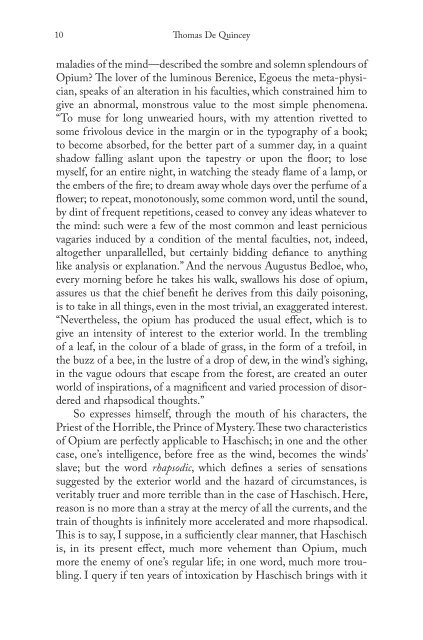Bloom's Literary Themes - ymerleksi - home
Bloom's Literary Themes - ymerleksi - home
Bloom's Literary Themes - ymerleksi - home
Create successful ePaper yourself
Turn your PDF publications into a flip-book with our unique Google optimized e-Paper software.
10<br />
Thomas De Quincey<br />
maladies of the mind—described the sombre and solemn splendours of<br />
Opium? The lover of the luminous Berenice, Egoeus the meta-physician,<br />
speaks of an alteration in his faculties, which constrained him to<br />
give an abnormal, monstrous value to the most simple phenomena.<br />
“To muse for long unwearied hours, with my attention rivetted to<br />
some frivolous device in the margin or in the typography of a book;<br />
to become absorbed, for the better part of a summer day, in a quaint<br />
shadow falling aslant upon the tapestry or upon the floor; to lose<br />
myself, for an entire night, in watching the steady flame of a lamp, or<br />
the embers of the fire; to dream away whole days over the perfume of a<br />
flower; to repeat, monotonously, some common word, until the sound,<br />
by dint of frequent repetitions, ceased to convey any ideas whatever to<br />
the mind: such were a few of the most common and least pernicious<br />
vagaries induced by a condition of the mental faculties, not, indeed,<br />
altogether unparallelled, but certainly bidding defiance to anything<br />
like analysis or explanation.” And the nervous Augustus Bedloe, who,<br />
every morning before he takes his walk, swallows his dose of opium,<br />
assures us that the chief benefit he derives from this daily poisoning,<br />
is to take in all things, even in the most trivial, an exaggerated interest.<br />
“Nevertheless, the opium has produced the usual effect, which is to<br />
give an intensity of interest to the exterior world. In the trembling<br />
of a leaf, in the colour of a blade of grass, in the form of a trefoil, in<br />
the buzz of a bee, in the lustre of a drop of dew, in the wind’s sighing,<br />
in the vague odours that escape from the forest, are created an outer<br />
world of inspirations, of a magnificent and varied procession of disordered<br />
and rhapsodical thoughts.”<br />
So expresses himself, through the mouth of his characters, the<br />
Priest of the Horrible, the Prince of Mystery. These two characteristics<br />
of Opium are perfectly applicable to Haschisch; in one and the other<br />
case, one’s intelligence, before free as the wind, becomes the winds’<br />
slave; but the word rhapsodic, which defines a series of sensations<br />
suggested by the exterior world and the hazard of circumstances, is<br />
veritably truer and more terrible than in the case of Haschisch. Here,<br />
reason is no more than a stray at the mercy of all the currents, and the<br />
train of thoughts is infinitely more accelerated and more rhapsodical.<br />
This is to say, I suppose, in a sufficiently clear manner, that Haschisch<br />
is, in its present effect, much more vehement than Opium, much<br />
more the enemy of one’s regular life; in one word, much more troubling.<br />
I query if ten years of intoxication by Haschisch brings with it
















